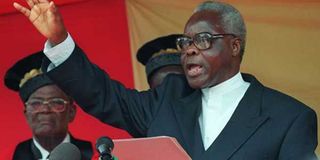Week-long mourning starts for former Benin president Mathieu Kerekou

Mathieu Kerekou taking oath of office as Benin's president in this photo taken on April 4, 1996. Kerekou died on Wednesday October 14, 2015 aged 82. AFP PHOTO | CHRISTOPHE SIMON
What you need to know:
- The green, red and yellow national flag was lowered to half-mast across the West African country as political figures led tributes.
- He seized power in 1972, 12 years after independence from France and installed a Marxist-Leninist regime until 1991.
- He returned from "retirement" in 1996 to win the presidency and ruled for a further 10 years.
COTONOU
A week of national mourning began in Benin on Thursday for former military ruler and civilian president Mathieu Kerekou after his death aged 82.
The green, red and yellow national flag was lowered to half-mast across the West African country as political figures led tributes.
One of the world's longest-serving political leaders, Kerekou was dubbed ‘The Chameleon’ for his transformation from Marxist-inspired coup leader to democratically-elected president.
He died in Cotonou on Wednesday.
He had been ill in recent times but the cause of death was not immediately disclosed and no date for his funeral was announced.
Adrien Houngbedji, who leads the National Assembly, described Kerekou as "a great democrat, a great statesman and man of peace."
GREAT STATESMAN
"I would even say he was surely the greatest statesman of the post-colonial period," he told reporters.
Houngbedji stood for election against Thomas Boni Yayi in 2006, when Kerekou was forced to step down as president as he had reached the constitutional age limit.
Boni Yayi won the vote and has been in power ever since.
Kerekou spent 30 years in power in total, straddling a turbulent post-colonial period to democratic rule in one of the world's poorest nations.
He seized power in 1972, 12 years after independence from France and installed a Marxist-Leninist regime until 1991 and the introduction of multi-party politics.
He returned from "retirement" in 1996 to win the presidency and ruled for a further 10 years.
Ali Houdou, a former minister under Kerekou, remembered a man who "worked all his life for peace".
"He wanted to go leaving us peace and it's for that reason I invite everyone in Benin to rally so the next five years are in the spirit of the national conference," he added.
Kerekou's national conference in 1990 was the first of its kind in Africa and brought together political opponents and civil society groups.
ADMITTED MISTAKES PUBLICLY
At the forum he publicly admitted his mistakes, renounced radical left-wing ideology and agreed to install a transitional government before democratic elections the following year.
Boni Yayi steps down in February 2016 after a maximum two terms of office allowed by the constitution, with the race to succeed him seen as wide open.
For many Beninese, Kerekou was remembered as both charismatic and frightening in equal measure, which was reflected in many people's memories of his time in power.
Paul Esse, secretary general of the CSTB workers' union, said his organisation suffered the most under the former president, who was criticised for human rights abuses.
Esse, a former political prisoner under the hard-line revolutionary regime, described Kerekou as "a calamity for Benin. He was someone who killed freedom in Benin".
Kerekou's cryptic motto was "the branch will not break in the arms of the chameleon", which was interpreted as a warning of political chaos should he ever lose power.
Columnist Vincent Foly, editorial chief at the Nouvelle Tribune newspaper, wrote: "Mathieu Kerekou was an enigma and a mystery for all Beninese."





